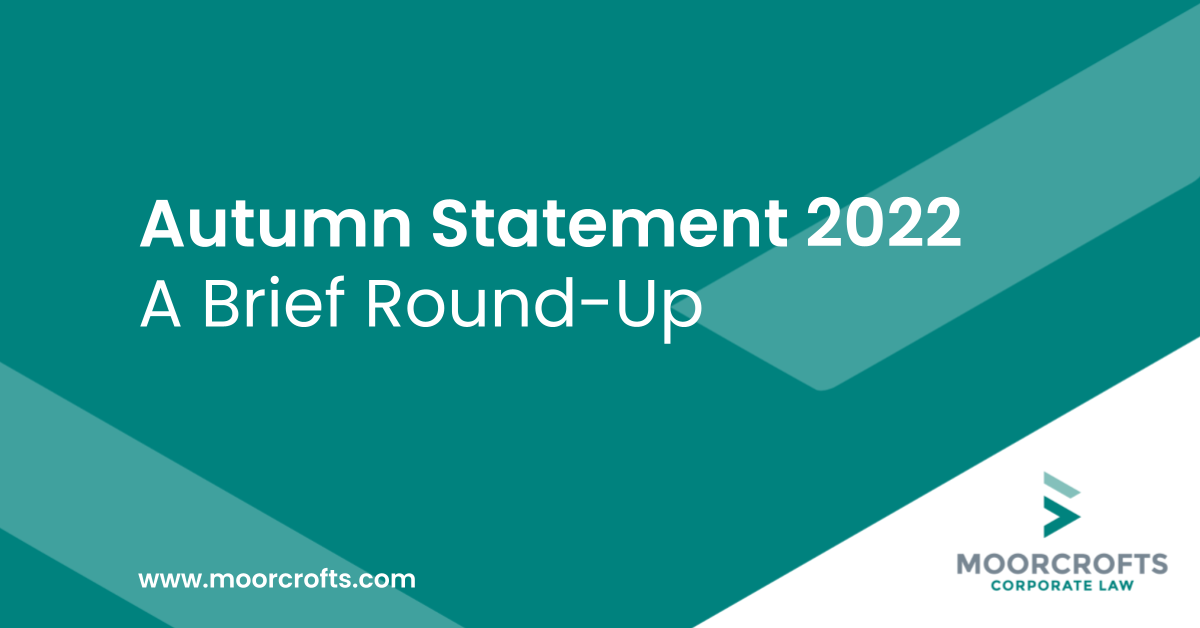Autumn Statement 2022 – A Brief Round-Up
Last week (23 September 2022), Chancellor Kwasi Kwarteng delivered the 2022 Autumn Statement, which included the “Growth Plan 2022”. The Growth Plan includes certain measures introduced in a bid to boost the UK’s economy and growth in a period of high inflation, soaring energy bills, a cost of living crisis and global financial and political uncertainty.
The Government’s scrapping of a proposed corporation tax rate hike, reversal of the increased rate of national insurance contributions, cut to the income tax rates and revisions to stamp duty land tax may have taken the headlines, but the Government also announced certain other measures to encourage company growth and employee incentivisation.
Employee Incentivisation Schemes
Attracting, retaining and rewarding employees is important for company growth. The Growth Plan included favourable arrangements for companies that have ceased to qualify under the tax-efficient enterprise management incentives (EMI) scheme, through the Company Share Options Scheme (“CSOP”). From April 2023, qualifying companies will be able to grant CSOP options to employees over shares with a market value of up to £60,000 (double the current limit), providing an excellent opportunity to reward employees further. The “worth having” restriction on share classes within CSOP will be eased, which now better aligns the scheme rules of CSOP, providing an attractive alternative for companies that do not qualify under the EMI scheme but are seeking to incentivise employees.
Investment Incentives
Changes have been introduced to the Seed Enterprise Investment Scheme (“SEIS”). From April 2023, companies will be able to raise up to £250,000 of SEIS investment (a two-thirds increase). More companies will be able to take advantage of SEIS, as the gross asset limit will increase to £350,000 and the trading age to 3 years. These changes encourage investment in start-up and early-stage companies.
The government has also stated they remain supportive of the Enterprise Investment Scheme (“EIS”) and Venture Capital Trusts (“VCT”) and see the value of extending them in the future. EIS and VCT enable businesses to secure equity investment and grow rapidly, and so the government intends to safeguard both EIS and SEIS beyond 2025.
Changes to IR35
It was also announced that the 2017 and 2021 reforms to the off-payroll working rules (often referred to as IR35) will be repealed from 6 April 2023. This means that from that date individuals who provide their services via an intermediary such as a personal service company, will once again be responsible for determining their employment tax status and paying the appropriate amount of tax and NICs. This will mean that current obligations for the end-user client to make a status determination and potentially deduct tax and NICs will no longer apply from 6 April 2023.
Should you be interested in any of the above or reviewing your current incentivisation or investment schemes in light of the new measures or would like further information on the impact these new measures will have, please do not hesitate to contact us. Moorcrofts regularly acts for companies, shareholders, sellers, purchasers, investors and employees across a broad range of industry sectors, and will be able to advise on the necessary legislative and regulatory considerations arising from the Autumn Statement.



